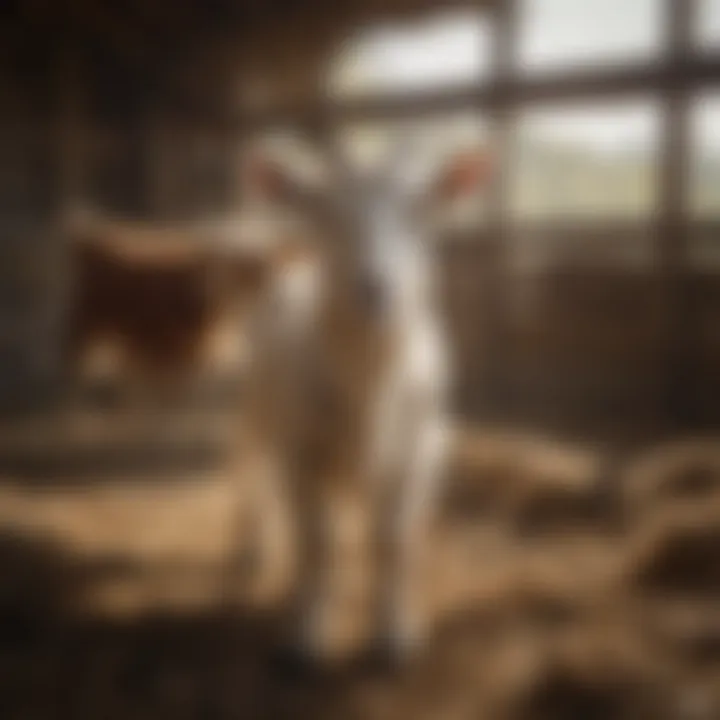Identifying the Best Probiotic for Goats


Intro
Understanding the role of probiotics in goat husbandry is essential for improving herd health and productivity. Probiotics consist of live bacteria that confer health benefits by enhancing gut flora. This helps in digesting feed more effectively, reducing the incidence of diseases, and improving overall well-being. A good selection of probiotics can thus raise the quality of milk, meat, and growth rates in goats.
This article will delve into key aspects of probiotics tailored for goats. It starts by exploring current trends in agriculture that relate to probiotic use, followed by criteria for selecting the best products. It will also review various probiotic strains, their benefits, potential drawbacks, and provide practical guidance for integrating them into goat diets.
Current Trends in Agriculture and Horticulture
Overview of Recent Innovations
In recent years, agricultural practices have shifted towards better animal welfare and health management. The integration of probiotics into livestock diets has become more common. Farmers and producers recognize that a healthy gut biota leads to better feed efficiency and overall animal performance. Thus, research supports the enhancement of gut microbiomes through targeted probiotic supplementation.
Sustainable Practices Gaining Popularity
Farmers increasingly focus on sustainable practices. Probiotics align with this trend as they can contribute to reduced reliance on antibiotics. By promoting natural gut health, probiotics can diminish the need for pharmaceutical interventions. This not only lowers production costs but also enhances product safety and marketability.
Essential Farming Techniques
Soil Health Management
While probiotics for goats primarily target gut health, good soil health is crucial as it impacts forage quality. Healthy pastures provide better nutrients, which ultimately benefit the goats’ health. Practices like crop rotation and organic amendments can boost soil vitality. This has a downstream effect on the quality of forage and hence, the probiotics consumed by goats.
Pest and Disease Control Strategies
Effective pest and disease management remain key to healthy goat farming. Utilizing probiotics could help lower the incidence of diseases, complementing traditional disease prevention efforts. Farmers are advised to integrate probiotics as part of a larger preventive health strategy. This could reduce disease outbreaks and lower veterinary costs in the long run.
Tools and Technology in Farming
Overview of Advanced Farming Tools
Emerging technologies in agriculture are enhancing the way farmers manage livestock. Digital platforms can help track animal health and nutrition, including probiotic usage. These tools enable better decision-making by providing data on herd performance and health trends, guiding the selection of suitable probiotic products.
Case Studies on the Use of Technology
Several farms have implemented advanced probiotic tools, seeing significant improvements in herd health and productivity. For example, a farm in Colorado reported enhanced milk production after introducing specific probiotic strains into their feeding regimen. Documenting these outcomes helps other farmers replicate successful strategies.
Probiotics can be a key factor in elevating the resilience and productivity of goat herds, reflecting the shift toward more informed and science-driven farming practices.
In summary, the integration of probiotics in goat farming not only complements existing health management strategies but also aligns with contemporary trends towards sustainability and efficiency. By understanding how to implement these products effectively, farmers can contribute to healthier, higher-yielding herds.
Understanding Probiotics
Understanding probiotics is essential for anyone involved in the care and cultivation of goats. Probiotics are living microorganisms that contribute to a healthy gut and overall animal wellbeing. They play a significant role in maintaining the balance of the gut microbiota, which influences various aspects of goat health, from digestion to immune response. This section will clarify what probiotics are, their functions, and the different types available for goats, providing crucial insights for farmers and enthusiasts alike.
Definition and Role
Probiotics are defined as beneficial bacteria that help maintain the body’s natural balance of flora, particularly within the digestive system. For goats, probiotics aid in breaking down food, absorbing nutrients, and producing essential vitamins. They also compete with harmful bacteria, setting up a barrier against infections.
The role of probiotics goes beyond just aiding digestion. They can enhance the immune system and improve overall health by promoting a beneficial microbial environment in the gut. Proper gut health is crucial for preventing diseases, leading to a more productive herd. When goats have a balanced gut microbiome, they show better growth rates and feed efficiency.
Types of Probiotics
There are various types of probiotics available for goats, each with different strains that provide unique benefits. The most common categories include:
- Lactobacillus species: Known for enhancing digestive function and improving gut health.
- Bifidobacterium species: These strains are effective in supporting the immune system and reducing bowel disorders.
- Enterococcus faecium: This strain is often used for its role in improving feed intake and nutrient absorption.
When selecting probiotics, it's essential to focus on the specific needs of your goats. Different strains may perform better under various conditions or health challenges. Understanding the characteristics and advantages of these probiotics allows for informed choices when integrating them into goat diets.
Probiotics can create favorable conditions in the gut that support digestion and immunity, leading to healthier and more productive goats.
Importance of Probiotics in Goat Health
Probiotics are essential for maintaining optimal health in goats. Their significance lies in their ability to improve various aspects of goat health, primarily focusing on digestive efficiency and immune support. Understanding how probiotics function can guide farmers in selecting the best products tailored for their herds. This article delves into specific benefits, considerations, and the role probiotics play in goat husbandry.


Digestive Health
Digestive health is a cornerstone of overall wellbeing in goats. Probiotics contribute remarkably to gut health by promoting a balanced microbiota. When goats consume probiotics, beneficial bacteria colonize their intestines, which helps in breaking down feed efficiently. This action enhances nutrient absorption and overall feed conversion ratio.
Moreover, probiotics can minimize the risk of gastrointestinal disturbances. They cope with harmful bacteria through mechanisms such as competitive exclusion. This means that the beneficial bacteria occupy the gut, making it harder for pathogens to establish themselves. Research indicates that goats supplemented with probiotics often show fewer signs of digestive trouble, such as bloating or diarrhea.
Additionally, probiotics can aid in mitigating the effects of stress-related digestive issues. Goats can experience stress from various sources, including transport and environmental changes. Probiotics help stabilize gut flora during such times, leading to a calmer digestive system. Implementing probiotics can thus lead to enhanced productivity and healthier herds.
Immune System Support
The immune system in goats is crucial for defending against diseases. Probiotics assist in strengthening this immune response. By fostering a diverse range of gut bacteria, these microorganisms play a vital role in stimulating the immune system. The gut houses a large portion of the immune cells, and a healthy gut flora can lead to increased antibody production.
Research shows that goats receiving probiotics tend to have a lower incidence of infections. These beneficial bacteria can enhance the effectiveness of vaccinations, as they improve the overall health of the immune system. When a goat has a robust gut microbiome, it is better equipped to deal with pathogens they may encounter in their environment.
Probiotics not only promote gut health but also support a strong immune response, highlighting their dual role in goat husbandry.
In summary, the importance of probiotics in goat health cannot be overstated. They aid in digestive health by enhancing nutrient absorption and reducing gastrointestinal problems. Furthermore, they support the immune system by fostering a diverse gut microbiome and increasing antibody production. These benefits collectively contribute to the overall health, productivity, and longevity of goats in agricultural settings.
Mechanisms of Action
Understanding the mechanisms of action of probiotics is vital to recognizing their role in goat health. Probiotics like Lactobacillus and Bifidobacterium species enhance digestive function and provide nutritional benefits. By identifying how these microorganisms interact with the goat's gastrointestinal system, farmers and animal nutritionists can make informed decisions about their use. This section focuses on two key mechanisms: competitive exclusion and nutrient absorption.
Competitive Exclusion
Competitive exclusion refers to the capacity of probiotics to occupy niches within the gut, thereby preventing harmful pathogens from taking hold. This mechanism is crucial in maintaining a balanced gut microbiome. The probiotics establish a dominance over pathogenic bacteria such as E. coli and Salmonella, making it harder for these harmful species to thrive.
Research has shown that when beneficial bacteria are present, they can outcompete pathogens for available nutrients and binding sites on the intestinal wall. This reduces the incidence of infections and diseases that can be detrimental to goat health. An important aspect of this mechanism is that it does not rely on antibiotics, promoting a more sustainable farming practice.
Nutrient Absorption
Nutrient absorption is another critical mechanism through which probiotics enhance goat health. Probiotics assist in breaking down complex carbohydrates and proteins that goats consume, making these nutrients more available for absorption. This process can lead to better growth rates and improved overall health of the herd.
By enhancing the integrity of the intestinal barrier, probiotics also facilitate efficient uptake of vitamins and minerals. For example, vitamin B12 and certain fatty acids can be better absorbed when beneficial bacteria are present in the gut. This optimal absorption not only supports growth but also boosts the immune response in goats.
Criteria for Selecting Probiotics
When selecting probiotics for goats, it is crucial to evaluate certain criteria that determine their effectiveness and suitability for your herd. These criteria help in ensuring that the chosen probiotics will provide the desired benefits and maintain goat health, ultimately aiding in better management practices. Understanding these elements is key for farmers looking to improve digestive health, nutrient absorption, and overall well-being of their goats.
Strain Efficacy
Strain efficacy refers to the capacity of specific probiotic strains to achieve intended health benefits. Each strain possesses unique properties and may affect goat health differently. For instance, Lactobacillus rhamnosus is often recognized for enhancing gut flora balance, while Bifidobacterium lactis may support immune health. When selecting probiotics, it is important to:
- Research strain-specific benefits: Some strains are better suited for certain health outcomes than others.
- Consider the target issue: The desired health effect should guide the choice of strain. For example, if diarrhea is a concern, strains specifically addressing gut health are preferred.
It’s advisable to look for products that provide scientific backing for their claims of strain effectiveness. The efficacy of the strains used plays a pivotal role in the success of probiotic supplementation.
Survivability in the Digestive Tract
The ability of probiotics to survive the harsh conditions of the goat's digestive system is paramount. This includes the resilience to stomach acidity and bile salts. Probiotics that do not survive may not provide any benefits, making survivability a key selection criterion. Factors to consider include:
- Encapsulation techniques: Some products use advanced encapsulation to protect bacteria as they pass through the stomach. This increases the likelihood they will reach the intestines alive.
- pH stability: Look for strains that exhibit robust performance across a range of pH levels in the digestive tract.
"The robustness of probiotic strains significantly impacts their effectiveness in promoting gastrointestinal health in goats."
Formulation and Delivery
The formulation and delivery method of probiotics is another crucial aspect. Farmers should examine how these products are designed to ensure maximum efficacy. Key considerations include:
- Type of product: Probiotics come in various forms such as powders, liquids, or granules. Each form has its advantages depending on the feeding practices in place. For instance, powdered forms may be easier to mix into feed.
- Combination with prebiotics: Some formulations combine probiotics with prebiotics, which can enhance the beneficial effects. Prebiotics serve as food for probiotics, thereby boosting their longevity and efficacy in the gut.
- Storage conditions: Proper storage is necessary to maintain the viability of the bacteria. Those that require refrigeration usually have a higher shelf life compared to those that do not.
When evaluating the formulation and delivery, farmers should consider not only the type but also the ease of incorporation into the goats’ diet, as this can significantly influence consistency and effectiveness.
Common Probiotic Strains for Goats


Probiotics play a crucial role in the health management of goats. Identifying the right probiotic strains can make a significant difference in animal health, productivity, and overall well-being. Different strains have unique benefits and functions, and understanding these can aid in making informed decisions for goat care.
Lactobacillus species
Lactobacillus species are among the most commonly used probiotic strains in goats. These bacteria are known for their ability to ferment carbohydrates, producing lactic acid as a byproduct. This process lowers the pH in the gut, which helps inhibit the growth of harmful bacteria.
The benefits include:
- Enhanced Digestion: Lactobacillus improves the breakdown of feed components, making nutrients more available to the goat.
- Suppression of Pathogens: By creating a more acidic environment, Lactobacillus prevents the colonization of pathogens such as Salmonella and E. coli.
These properties not only promote gut health but also support a stronger immune response. Farmers should consider including Lactobacillus in their probiotic strategies to reap these benefits.
Bifidobacterium species
Bifidobacterium species are another essential group of probiotics used for goats. They reside primarily in the large intestine and play an important role in maintaining gut health. These bacteria are known for their ability to ferment oligosaccharides, leading to the production of short-chain fatty acids that are beneficial for gut cells.
The advantages observed from Bifidobacterium include:
- Gut Barrier Function: They help maintain the integrity of the gut lining, which is essential for preventing harmful substances from entering the bloodstream.
- Immune Modulation: Bifidobacterium has been shown to enhance the immune response in goats, potentially leading to lower incidence of disease.
Utilizing Bifidobacterium in goat diets can promote optimal digestive health and bolster the immune system.
Enterococcus faecium
Enterococcus faecium is another probiotic favored in goat production. This bacterium can survive well under the conditions of the gastrointestinal tract, which is critical for its effectiveness as a probiotic. Its role in promoting gut health is particularly notable.
Key benefits associated with Enterococcus faecium include:
- Competitive Exclusion: By colonizing the intestines, Enterococcus faecium can outcompete pathogenic bacteria for resources and space, thereby reducing the risk of gastrointestinal disorders.
- Nutritional Absorption: Many studies suggest that this strain aids in better nutrient uptake from feed, thereby enhancing overall growth and health in goats.
When integrated into the feed regime, Enterococcus faecium can be a valuable addition, ensuring goats receive maximum benefit from their diet.
In summary, understanding various probiotic strains is integral for successful goat management. Each strain offers specific benefits that can aid in better overall health and productivity. Farmers should carefully consider these options in their veterinary protocols.
Selecting the right strains leads to well-being in goats, ultimately improving farm efficiency and productivity.
Benefits of Probiotics for Goats
Understanding the benefits of probiotics is essential for goat husbandry. Probiotics are microorganisms that can provide health benefits when administered in adequate amounts. They can significantly impact several areas of goat health. Here, we will focus on three primary benefits: improved feed efficiency, enhanced growth rates, and reduced incidence of diarrhea.
Improved Feed Efficiency
Probiotics can enhance feed efficiency in goats. When goats consume a balanced diet with probiotics, these microorganisms help in the breakdown and absorption of nutrients. They promote a healthy gut environment that aids digestion. As a result, goats can convert feed into energy more effectively. This efficient nutrient utilization not only helps in maintaining optimal body condition but also reduces feed costs for farmers.
Research shows that including probiotics in the diet can lead to higher forage intake and better weight gain. Improved feed efficiency means goats can achieve their growth targets more effectively, which can lead to better economic outcomes for farmers.
Enhanced Growth Rates
Another critical advantage of probiotics in goats is their role in enhancing growth rates. Healthy gut flora promotes optimal nutrient absorption, leading to better weight gain. For young goats, especially, probiotics can support rapid growth and development. They help in synthesizing vitamins and other essential nutrients. Furthermore, probiotics can also reduce the stress on goats during weaning or transportation, which can be periods of slowed growth.
Farmers may observe that kids receiving probiotics show a noticeable increase in daily weight gain as compared to those who do not receive them. This translates into more profitable livestock production, given that growth rates are a key factor when evaluating goat performance.
Reduced Incidence of Diarrhea
Diarrhea is a common issue in goats, often linked to dietary changes, stress, or infection. Probiotics can play a vital role in mitigating this problem. They help establish a balanced microbial community in the gut. This balance can outcompete harmful bacteria, thus reducing the risk of gastrointestinal disturbances. By maintaining gut health, probiotics can lower the incidence of diarrhea among goats, which leads to improved overall health and reduced veterinary costs.
"The integration of probiotics into goat diets is an investment in health and productivity."
Potential Drawbacks and Considerations
The use of probiotics in goat care is not without its challenges. While the benefits of probiotics are well documented, it is essential for farmers and enthusiasts to also understand the potential drawbacks. This section will address critical issues related to the overuse of probiotics and quality control, which are vital for maintaining the health of the herd and ensuring cost-effectiveness in livestock management.
Overuse of Probiotics


Overusing probiotics can lead to various complications in goats. One concern is the potential disruption of the natural gut flora. Goats rely on a balanced microbiome for digestion and overall health. Introducing excessive quantities of probiotics may lead to an imbalance, resulting in gastrointestinal disorders. Symptoms can include bloating, diarrhea, or even reduced feed efficiency.
Additionally, the overuse of probiotics can pose a financial burden. Farmers may find themselves investing in products that are not necessary for the herd's health. It is essential to determine the appropriate dosage and timing for administering probiotics rather than relying on them as a daily supplement without clear evidence of need.
"Balance is crucial when using probiotics. Too much can be detrimental rather than beneficial."
Ensuring that probiotics are used strategically can help mitigate these risks. It is wise to consult with a veterinarian to create a tailored probiotic plan that fits the specific requirements of the goats.
Quality Control Issues
Quality control is another significant factor to consider when selecting probiotics for goats. The probiotic market is vast and not all products meet the same standards. Some products may lack the necessary strains of bacteria or may not contain viable microorganisms by the time they reach the consumer. This can lead to ineffective treatments, wasting both time and money.
Farmers should look for products that are backed by research and come from reputable manufacturers. Third-party testing can provide assurance that the product contains what it claims. Additionally, checking for certifications and reading reviews can guide farmers in choosing higher quality probiotics.
Integrating Probiotics into Goat Diets
The integration of probiotics into goat diets is essential for maximizing the health and productivity of these animals. Probiotics play a vital role in maintaining gut health, which in turn affects overall well-being. The inclusion of these beneficial microorganisms can help establish a balanced gut microbiota, enhancing the nutritional uptake and immune response of goats. Therefore, understanding how to effectively integrate probiotics into their diets is crucial.
Timing and Dosage
When it comes to the timing and dosage of probiotics, several factors come into play. Timing is critical; introducing probiotics during stress periods, such as weaning or before transportation, can significantly improve their effectiveness. For instance, goats under stress conditions tend to experience disruptions in their gut flora.
Dosage should be tailored based on the specific probiotic strain used and the size of the herd. Generally, it is recommended to follow the guidelines provided by the manufacturer, which often indicate dosages based on the weight of the animals. Regular monitoring of the goats' health after introducing probiotics can help in adjusting the dosage. This ensures that the optimum amount is administered without resulting in overuse, which could lead to unexpected health issues.
Types of Feed
The effectiveness of probiotics can also depend on the type of feed being utilized. Certain feeds may facilitate or hinder the growth of beneficial bacteria. For example, high-fiber feeds often support probiotic effectiveness due to their favorable conditions for fermentation. Consider integrating either hay or silage into the diet, which can serve as a good carrier for probiotics. On the other hand, processed feeds with high levels of preservatives may inhibit the survival of introduced probiotics.
Additionally, feeding approaches should consider incorporating molasses-based or other nutrient-rich feeds, as these can help mask the flavor of the probiotic and increase their acceptance among goats. Mixing probiotics into the ration can encourage young goats to consume them without resistance, thus ensuring they receive the intended benefits. Regular adjustments in feed types will help maintain the benefits of probiotics over time.
Research and Case Studies
Research and case studies play a vital role in identifying the best probiotics for goats. They offer evidence-based insights and practical applications that inform farmers and researchers alike. With the growing interest in animal health, particularly in dairy and meat production, understanding how probiotics function in goats has become crucial. Through systematic studies, we can unravel the complexities of goat microbiota and how probiotics can enhance their health.
Most importantly, research into goat probiotics helps establish which strains are effective. Different probiotic strains may exhibit distinct benefits based on the specific conditions they are subjected to, such as dietary factors or the overall health of the herd. Effective research also lays the groundwork for innovation in goat health products.
Additionally, examining case studies allows for a real-world evaluation of probiotics in various farm settings. These insights often highlight the advantages as well as setbacks encountered during implementation. By sharing these experiences, farmers gain a better understanding of how to navigate the use of probiotics effectively in their routines.
"Evidence-based approaches to probiotic implementation ensure that farmers make informed decisions, ultimately leading to healthier herds."
Overall, bridging the gap between theoretical research and practical application serves to enhance the quality of goat farming.
Recent Studies on Goat Probiotics
In recent years, numerous studies have emerged that focus specifically on probiotic use in goats. These studies have explored various aspects, from the types of beneficial bacteria to their effects on nutrient digestion and overall health. One notable area of research is the impact of specific strains on milk production in dairy goats.
For example, a study conducted by researchers from the University of Tennessee demonstrated that the inclusion of Lactobacillus rhamnosus in goat diets increased milk yield by improving gut health and nutrient absorption. Similarly, other studies have indicated that Bifidobacterium species can significantly reduce instances of diarrhea in young goats, confirming their role in enhancing digestive health.
Upon analyzing these findings, it is clear that probiotics have a substantial positive influence on goat husbandry. The study results often encourage producers to consider probiotics as a routine part of their management practices rather than an optional supplement. Furthermore, ongoing research will adapt existing strains for better results and develop new ones tailored to specific needs.
Practical Applications
Applying research findings in practical settings is essential for realizing the benefits of probiotics in goat ranching. Successful integration often involves selecting the right strains based on evidence gathered from both laboratory studies and real-life case studies.
Farmers should focus on the following practical steps when considering probiotics:
- Evaluation of Needs: Assess the health status of the herd. Identify specific issues such as digestive problems or low milk production.
- Strain Selection: Choose strains that research indicates are effective for the identified issues. For instance, if diarrhea is a concern, Bifidobacterium might be the ideal option.
- Diet Integration: Incorporate probiotics gradually into the goat diet. This allows animals to acclimatize to the changes without shocking their systems.
- Monitoring Results: Keep track of any changes in health, production, or behavior post-probiotic implementation. Adjust dosage and strains as necessary based on monitoring outcomes.
Through thoughtful application of research findings, farmers can optimize goat health and production levels while fostering a sustainable agricultural environment.
In summary, exploring both current studies and practical applications equips farmers with knowledge and tools critical to making informed decisions about probiotics.
Closure
In this article, we have explored the various dimensions of selecting the best probiotics for goats. The conclusion synthesizes these insights, emphasizing the significant role probiotics play in optimizing goat health and productivity.
Importance of Probiotics
Probiotics are not merely supplements; they are integral to maintaining a balanced gut microbiota. This balance is crucial for digestive efficiency and overall health of the herd. By understanding the importance of these beneficial bacteria, farmers can make informed decisions about their goats' diets.
Specific Benefits
The benefits of using probiotics extend beyond digestive health. Probiotics can enhance immune function, improve feed efficiency, and reduce incidences of gastrointestinal disturbances. This is especially vital in young goats whose immune systems may still be developing. By incorporating probiotics into their diet, farmers can promote healthier growth rates and ultimately achieve better production outcomes.
Considerations
When implementing probiotics, it is essential to consider the specific needs of the goats and the environment in which they are raised. The choice of probiotic strains must match the goals of the farming practice. Additionally, monitoring the effects and adjusting dosages is necessary for optimal results.
Final Thoughts



